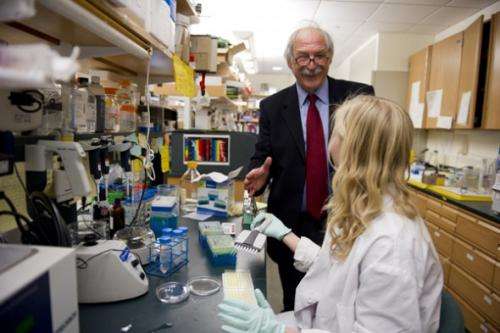The brakes of inflammation

In the last few decades, scientists have come to attribute an immunological explanation to many cancers. It is now thought that tumors rise up routinely in the body but that a healthy immune system blocks their development. Thus, for patients who do develop cancer, the immune system is partially to blame.
Treatment has therefore come to involve immunotherapy, in which clinicians stimulate a patient's immune system with cancer vaccines. The immune system responds by creating T-cells whose job is to kill the tumor cells.
"But immunotherapy of cancer doesn't live up to expectations," according to Northeastern professor Michail Sitkovsky, adding that T-cells induced by cancer vaccines simply don't kill tumor cellss inside the body, though they do so quite well in a petri dish.
"The killer cells were alert and eager to kill the tumor, but the tumor managed to put the killer to sleep," said Sitkovsky, the Eleanor W. Black Chair and Professor of Immunophysiology and Pharmaceutical Biotechnology and founding director of Northeastern's New England Inflammation and Tissue Protection Institute. "This is what happens in a majority of cancers."
But what, Sitkovsky wanted to know, puts the killer cells to sleep?
His desire to find out spurred him and his research team to discover a signaling pathway that he calls "the brakes of the immune system," which was reported in 2001 in the journal Nature. In the last several years, many researchers have followed up on Sitkovsky's work, implicating the pathway in a variety of inflammatory diseases. In a recent article in the esteemed New England Journal of Medicine, he and his colleagues at the University of Colorado School of Medicine and Harvard Medical School reviewed the body of work that has emerged since Sitkovsky's discovery.
The findings indicated that, during inflammation, molecules called "purines" are released from cells and act as physiological brake pedals by inhibiting an immune response. "This is how the immune system works," said Sitkovsky. "It is activated to kill pathogens, but it also has brakes because the immune system does a lot of collateral damage to innocent bystanders."
The most important among these bystanders are the cells lining our blood vessels. "Because of damage to blood vessels, there is interruption of blood supply," Sitkovsky explained. "No blood supply: no oxygen supply." This lack of oxygen is called hypoxia, which triggers the release of a purine molecule called adenosine. When adenosine binds to receptors on the surface of T-cells, they stop their killing spree, acting as the immune system's brake pedal.
And here's the clincher: Tumors, which grow so quickly that blood vessels can't keep up with them, have evolved to persevere in the absence of oxygen and are inherently hypoxic. As a result, they are riddled with adenosine.
"So killers come"—here Sitkovsky grasped his throat and pretended to asphyxiate—"and then run away!"
To forcibly restore T-cells' immunological function, he and his team of researchers looked for a drug that would block the effects of adenosine. In a great stroke of luck, it turned out that the most widely used and easily accessed psychoactive drug in the world—caffeine—does just that.
Sitkovsky looked to epidemiology for evidence of a correlation between coffee drinkers and tumor suppression and found that dozens of studies with hundreds of thousands of participants showed that coffee seemed to have a cancer-preventive effect in women. The pattern wasn't as strong among males, because testosterone, like adenosine, is another immunosuppressant.
The team's preclinical studies using high doses of caffeine to block adenosine resulted in tumor rejection and mouse survival. The results were reported in the Proceedings of the National Academy of Sciences in 2006 and the approach is now being tested in human clinical trials in conjunction with traditional cancer immunotherapy techniques.


















